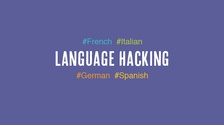Why Chinese is Easier than you think!
A while back, I dedicated some time to learning to speak Mandarin, and the Internet nearly imploded at the idea of me trying to do it in a short time. I heard protests of it being the hardest language in the world, but I went ahead anyway.
After a few months of learning it in Taiwan, I went on to travel over 2,000km of trains through China, learning Kung Fu from a master in a village, meeting a Buddhist monk in a monastery, making friends and using my Mandarin along the way.
What I learned in this experience was that Chinese isn’t that difficult after all. Like with all the languages I learn, I focused on speaking from day one and finding shortcuts and hacks to make the learning stick.
Click here to find out why learning Mandarin is easy.
https://www.italki.com/article/Aumjywne3SKq3lVVaKKkJC/The-ways-you-can-make-learning-Mandarin-easy
And if you’re ready to start learning, you can also check out my new book.
https://go.italki.com/LanguageHackingMandarin
-Benny Lewis, Language Hacker
More information can be found here.
https://www.italki.com/languagehacking

